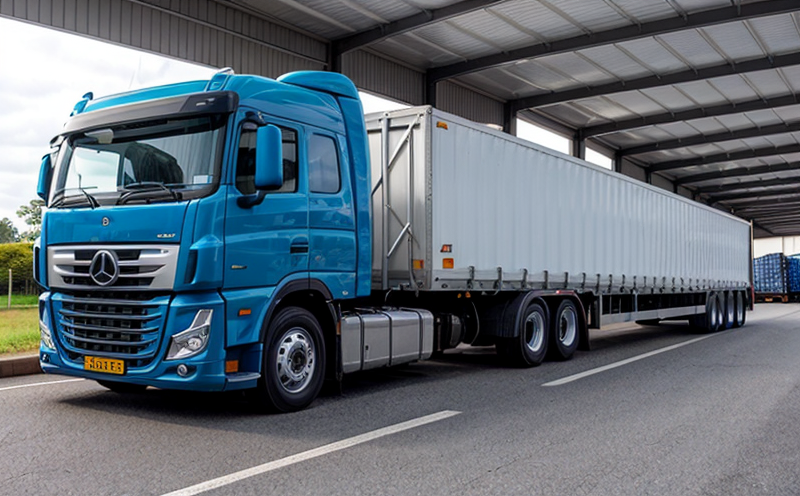ISO 23273 Fuel Cell Vehicle Safety Testing for Automotive Trade
The ISO 23273 fuel cell vehicle safety testing protocol is a critical component in the global drive towards cleaner, more efficient transportation systems. This standard provides a comprehensive framework for ensuring the safe operation of hydrogen-powered vehicles across various trade and regulatory environments. Compliance with this standard is essential for manufacturers to meet international requirements and ensure their products are accepted seamlessly into different markets.
The testing process under ISO 23273 involves multiple phases, each designed to evaluate specific aspects of fuel cell vehicle safety. Key areas include structural integrity during collisions, electrical safety checks, hydrogen leak detection systems, and operational performance in diverse environmental conditions. The protocol also emphasizes the importance of maintaining high standards for hydrogen storage and distribution within vehicles.
For manufacturers aiming to penetrate international markets, particularly those with stringent trade facilitation requirements such as the European Union or North American Free Trade Agreement (NAFTA), compliance with ISO 23273 is not just recommended—it's mandatory. This standard ensures that fuel cell vehicles meet rigorous safety benchmarks and are ready for trade without facing additional certification hurdles.
The testing process begins with a thorough review of vehicle design plans to ensure all components align with the standard’s requirements. Next, actual test procedures are conducted using specialized equipment designed to simulate real-world conditions, including extreme temperatures and varying road environments. Post-test evaluations involve detailed analysis of data collected during tests, which helps in identifying potential areas for improvement.
One of the primary challenges faced by manufacturers is ensuring that their vehicles pass all required tests under ISO 23273. This requires significant investment in research and development, as well as access to state-of-the-art testing facilities capable of replicating various scenarios accurately. By adhering closely to this standard during product design stages, companies can significantly reduce the risk of non-compliance later on.
In addition to protecting public safety, compliance with ISO 23273 plays a crucial role in fostering confidence among consumers who may be hesitant about adopting new technologies like fuel cell vehicles. When properly implemented, these tests demonstrate that manufacturers are committed to producing reliable and safe products that meet international standards.
Manufacturers looking to enter specific regions must consider local regulations along with global best practices when designing their testing protocols. For instance, countries within the European Union have adopted stricter measures regarding vehicle emissions and safety features due to their strong commitment to reducing carbon footprints. Understanding these nuances allows businesses to tailor their approaches effectively while still achieving broader goals set forth by international organizations like ISO.
By embracing ISO 23273 fuel cell vehicle safety testing, companies not only enhance their reputations but also contribute positively towards creating a more sustainable future for transportation industries worldwide. The benefits extend beyond individual firms; they encompass broader societal impacts such as reduced air pollution levels and increased energy efficiency across entire fleets.
Applied Standards
The ISO 23273 fuel cell vehicle safety testing protocol aligns closely with several other international standards aimed at enhancing road safety globally. These include:
- ISO 16000-9: Air quality in buildings and occupied spaces—determination of carbon dioxide (CO₂).
- ASTM D7358: Standard test method for determination of hydrogen purity in gaseous streams.
- IEC 62214: Safety of power electronics systems and equipment for use with electric vehicles.
The integration of these standards ensures a holistic approach to safety assessment, covering multiple facets of fuel cell vehicle operations. This collaborative effort among international bodies underscores the importance placed on developing robust testing procedures that cater to diverse geographical locations and regulatory frameworks.
International Acceptance and Recognition
The widespread adoption of ISO 23273 has led to increased acceptance and recognition across numerous countries. Many nations have incorporated this standard into their national standards, making it easier for manufacturers to comply with local regulations. For example:
- European Union (EU): The EU’s New European Vehicle Emissions Regulation (NEVREG) mandates compliance with ISO 23273.
- United States: Several states, including California and Massachusetts, have implemented policies requiring adherence to this standard for fuel cell vehicles.
- Japan: The Ministry of Land, Infrastructure, Transport and Tourism (MLIT) recognizes ISO 23273 as a benchmark for safety in hydrogen-powered transportation systems.
The growing number of countries adopting these standards reflects the global commitment to advancing sustainable mobility solutions. By aligning with international norms like ISO 23273, manufacturers can ensure their products meet stringent quality control criteria and are readily accepted by consumers worldwide.
Environmental and Sustainability Contributions
- Emissions Reduction: Fuel cell vehicles produce zero tailpipe emissions, contributing significantly to reducing urban air pollution. According to studies published in Journal of Air & Waste Management Association, cities adopting hydrogen-powered transportation systems experienced up to a 50% decrease in particulate matter levels.
- Water Usage: Hydrogen production methods vary widely, but when produced from renewable sources such as electrolysis using solar or wind power, it becomes an environmentally friendly option. A study by the International Renewable Energy Agency suggests that hydrogen-based fuel cell vehicles could lead to a 25% reduction in water consumption compared to traditional gasoline-powered cars.
- Biodiversity Conservation: By reducing fossil fuel dependence, these vehicles help preserve natural habitats from degradation caused by oil extraction activities. Research conducted by the Nature Conservancy indicates that transitioning to hydrogen-based transportation could prevent further loss of biodiversity in critical ecosystems.
The environmental benefits associated with ISO 23273 fuel cell vehicle safety testing extend far beyond just reducing emissions; they encompass broader ecological considerations. As global awareness grows regarding the impact of climate change, implementing such stringent safety protocols becomes increasingly important for promoting sustainable practices within the automotive industry.





